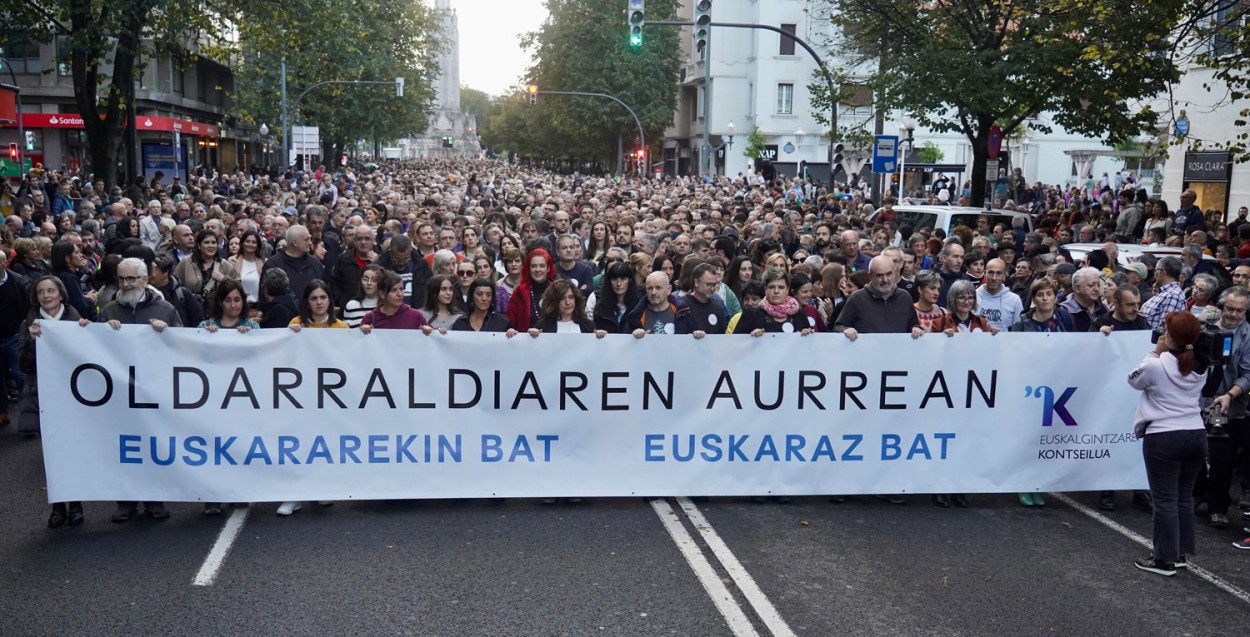
- The Council of Euskalgintza has assessed the decree which the Government has announced for the Basque government’s Euskaldunisation. Although it admits some advances, it highlights the deficiencies and negative changes of the decree from the initial to the final version. There are conditions for a “stronger leap”, but the Council believes that it has been “rejected”. “In this latest version of the decree, far from acting ambitiously and exceeding the limits imposed by judicial aggression, the cuts imposed by the courts have been reflected.”

Hours after the content of the new decree was known, the Council communicated its assessment by press release. It recalls that the new Decree of Normalization of the Use of the Basque Country in the Basque Public Sector replaces that of 1997 after 26 years, so it has a “fundamental importance” in the public administration and in the process of normalization of the Basque Country.
The Council has summarised the current situation: the right to relate in Basque with the administration is not guaranteed, let alone the right to relate in Basque in the administration, and the judicial aggression of recent years has called into question “the official status of the Basque Country itself”. The new decree should draw up a “transition process” that responds to all this and ensures compliance with these rights: “However, in the opinion of the Council, this new decree does not respond to the current challenges, gaps and obligations of the normalization of the Basque Country, it is not meant to be a strong leap”.
Positive aspects and their shortcomings
The Council acknowledges positive elements of the new Decree. “Among other things, the widening of the scope of influence to the entire public sector, the reception of administrative units in Basque, the possibility of establishing the need to carry out the examination in Basque in the selective processes, the possibility of certifying by examination the level of knowledge of the Basque country or the possibility of establishing asymmetric linguistic profiles according to the functions of each job”, also noting the deficiencies of some of them.
For example, while the impact on the entire administration is positive, in Osakidetza, in the Ertzaintza and in the Judiciary “have the greatest deficiencies from the point of view of linguistic rights” the decree will not be implemented until almost ten years. “By 2033, 60% of the Basque public sector will be excluded.” The Council also agrees on the adoption of new forms of accreditation of the linguistic profile. So far only the degree or studies could be equated, but the new decree will also take into account the performance of examinations in Basque and the assessment of the ability to work in Basque. But the performance of exams in Basque is considered as an “option” and not as an “obligation”, so the decree “leaves the decision subject to the institutional will”.
Highlights
The obvious lack of the new decree is the lack of definition of maturity, according to the Council. Remember that the Basque Law of 1982 received 42 years ago the “duty” to euskaldunize the administration, so the new decree should establish the deadlines, measures and means to achieve it. “Once this goal has been determined, the expiry date of this Decree should be provided for and the logic of linguistic profiles should be overcome.” Remember that in 2022 the Council, together with the ELA and LAB trade unions, presented a proposal for the euskaldunisation of the Basque administration for fifteen years. “It must be borne in mind that in the coming years half of the public employees will retire and that it will be the most Basque generation of all time that will be incorporated to replace them. But the new decree does not contemplate this juncture.”
The Council has also highlighted two further shortcomings. On the one hand, the decree maintains the model of linguistic profiles and the index of preceptivity. Even more so if we bear in mind that judicial aggression is emptying this model of substance. On the other hand, although the Council welcomes the inclusion of new decrees in the administration “the leap from the service language to the working language”, it denounces that “it does not provide sufficient resources and guarantees to do so”.
Changes from original version
Finally, the Council has expressed its “concern” over the changes that the decree has undergone from its original version to that made known today. According to the agent, “many essential content has remained in progress”, while others have added “generating setbacks”.
Some of the measures eliminated are measures that prioritized the Basque country. The Council explained that the institutional image of the first version of the decree would give “priority” to the Basque country, but the latest version says that “visibility will be enhanced”. Or, the first version that referred to the “requirement” that Euskera be a working language in the working areas with a linguistic profile in Euskera, while the latter refers to “Euskera also”. “These setbacks are perceived with concern by the Council, reflecting signs of judicial aggression in recent years.”
On the contrary, the decree initially eliminated the exceptional treatment of workers over 45 years of age in accrediting the knowledge of the Basque Country, but has been reincorporated in the latest version. This is “particularly worrying”, says the Council, “because, according to the new case law established in the framework of judicial aggression, this exemption is being extended to cases of inmates, which although the decree clearly states that the exemption is only for officials holding the post”.